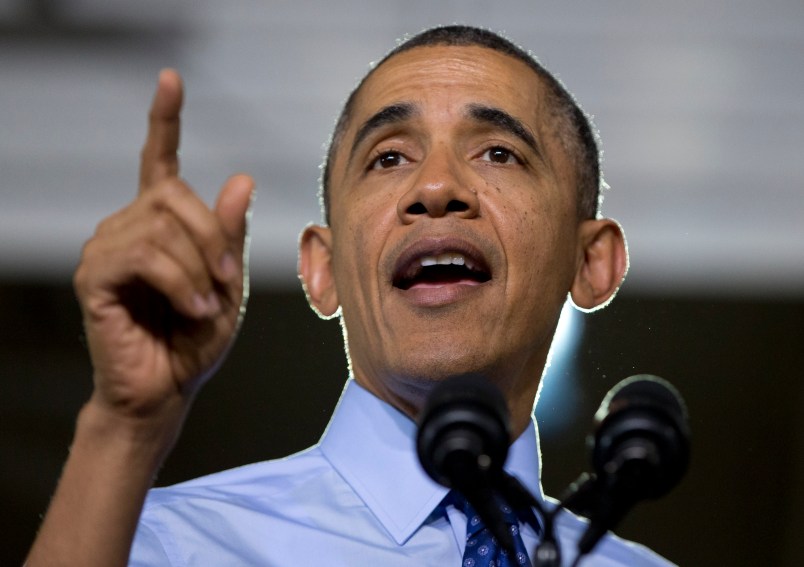There is an odd recognition in Rich Lowry’s pearl-clutching POLITICO Magazine piece, “The Callow President.” Lowry, who only ends up on the high road when he takes the wrong exit, accuses Barack Obama of recently striking a “characteristically — and tellingly — juvenile and plaintive note,” but by making an argument with all the staying power of the bar napkin he wrote it on, Lowry’s insult comes back on its author.
Lowry, the kind of deep thinker who offers stop-and-frisk as a proper response to the Sandy Hook shooting, commences the flailing about by finding fault with Obama’s admonition to his critics to “just stop hatin’ all the time.” All the dowagers in Georgetown have never clutched as many pearls as Lowry does over this bit of frustrated code-switching. Oh, the horror. The President dropped a g and employed a patois foreign to Lowry’s native Arlington.
Surely a graduate of the University of Virginia like Lowry knows that admittedly snide jibes have a long presidential history.
 Abraham Lincoln, in particular, was far more juvenile than Obama when he insulted Major General Joseph Hooker, saying, “The trouble with Hooker is that he’s got his headquarters where his hindquarters ought to be.” Of a lawyer he held in low esteem, Lincoln said, “He can compress the most words into the smallest ideas better than any man I have ever met.”
Abraham Lincoln, in particular, was far more juvenile than Obama when he insulted Major General Joseph Hooker, saying, “The trouble with Hooker is that he’s got his headquarters where his hindquarters ought to be.” Of a lawyer he held in low esteem, Lincoln said, “He can compress the most words into the smallest ideas better than any man I have ever met.”
Lyndon Johnson’s vulgarity could make a Hell’s Angel blush, but occasionally he tempered his language—and his temper—long enough to be quoted in polite society, such as when he said, “He’s a nice guy, but he played too much football with his helmet off.”
And what is Ronald Reagan’s “There you go again” but a slightly more grown-up version of “I know you are, but what am I?”
Lowry wrongly ascribes Obama’s slang to callowness when in fact the President was expressing a deep frustration with Republican obstruction. Obama has had it Up To Here with Congress, a legislative body less popular than hemorrhoids, toenail fungus, and cockroaches. Better plaintive than a plaintiff be, though. If Obama is saying Congress is wrong, he will always be right. Lowry can’t win that argument, so he ignores the source of Obama’s pique.
Unfortunately, that was the high point of his column. His contention that Obama is “not really an orator” reveals Lowry trying to punch down from below. He cites more evidence to the contrary (“He gave a truly inspired convention speech in 2004 and a few defining campaign speeches in 2008.”) than he does in support of his claim. All he has is the sad evidence that Obama’s speeches have lately “failed to move public opinion.” He goes beyond the DC trope of blaming “both sides” here to fault Obama for Republican intransigence, which at least has ambitious novelty going for it.
Perhaps Lowry would prefer a deep thinker such as George W. Bush, a man whom Lowry judged as “extremely forceful” with a “restless energy when he sits in a chair, and nearly leaps out of it when making certain points.” Now Bush is painting shower selfies, literally gazing at his navel, yet Lowry thinks Obama is the callow one?
Forgive Lowry this: As we approach the mid-point in Obama’s second term, the President remains an enigma, oddly remote despite his easy smile and familiarity. We live in an admittedly messy age, where one man’s leading from behind is another’s herding cats. Instead of a branded foreign policy doctrine, he offered pragmatism and nuance. He plays the long game in the Twitter age, bending cost curves while we debate daily tracking polls.
Lowry needn’t have tried so hard to break new ground in finding fault with Obama. You can’t swing a dead cat in D.C.—which is, coincidentally, the Republican legislative strategy—without finding a Democrat with legitimate complaints about Obama. By putting a policy on display and waiting for the public to recognize its obvious superiority—instead of, you know, selling it—Obama leaves himself open to hackish attempts at presidential analysis. It would be enough to disagree with a president on what he has done instead of conjuring a specter to whom Lowry can feel superior.







History preserves the words when writers like Lowry
work so hard for their Judith-Miller-moments.
Those who sell wrong-headedness for a buck
always seem surprised when their
reputational stock drops precipitously.
RW fever-talk has an expiry.
It’s sell-by date is the present.
It’s potency no longer lasting.
The demographic it’s aimed at-- fading, dying.
Lowry. Battling to be the loudest of the wrong.
jw1
Rich is such a precient judge of character, how can we forget his deep to the point, spot on observations of Sarah Palin
" I’m sure I’m not the only male in America who, when Palin dropped her first wink, sat up a little straighter on the couch and said, “Hey, I think she just winked at me.” And her smile. By the end, when she clearly knew she was doing well, it was so sparkling it was almost mesmerizing. It sent little starbursts through the screen and ricocheting around the living rooms of America. This is a quality that can’t be learned; it’s either something you have or you don’t, and man, she’s got it."
Yes Rich, it is true, it cant be learned,you either have something or you dont. You dont Rich.
Jason, this is unreadable.
Lowry is the most reflexive “Obama Bad”. This latest screed was ridiculous at best.
Callow is all Rich Lowry knows.